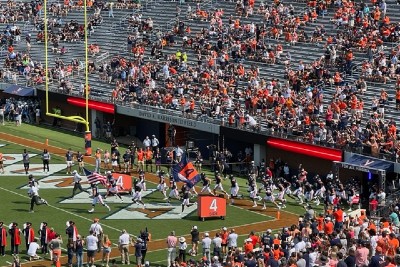
The fan experience at UVA football games continues to be subpar, with more complaints from this past weekend’s game about issues with concessions even with another much-less-than-capacity crowd on hand.
Those who ventured out and then hung around – the student section, again, emptied out noticeably at halftime – were actually treated to a good game, if you’re into exciting endings, with two lead changes in the final 1:01 as the good guys walked off to a 16-14 win over ODU.
But back to the fan experience part of things, where the money is made, it wasn’t a good day. The reported 40,000+ attendance figure was almost certainly a 10,000+ overestimate, as was the case in opener with Richmond, which would translate to another 30,000 or so unsold tickets for each of the first two home games.
Football, as you may have heard, is the money sport in college athletics, so those 30,000 empties translate to what, exactly?
From a gander at the VirginiaSports.com website, single-game tickets start in the $15-$20 range, with priority tickets topping out at $90, so when there are that many empties, you’re talking, easy, $1 million in lost ticket revenue per game for each of the first two UVA home games.
Continue at this pace, and the quick math translates to $7 million in lost revenue for Virginia Athletics, a huge gap for the people in the business office to have to account for.
The last set of complete figures we have for college athletics is still fiscal year 2019, since the FY 2020 numbers, which are now available, are partials due to the pandemic.
Looking at 2019, UVA reported $11.5 million in athletics ticket sales, $9 million less than Virginia Tech and Florida State, $13.3 million less than UNC, $18.4 million less than Clemson, $20.4 million less than Louisville, which leads the ACC, and $54 million less than Ohio State, which leads the Power 5.
And this is just in ticket sales. People who buy tickets and make their way in often buy at least a hot dog and a soda, and might snag a T-shirt or hat on their way in or out, putting more money into the coffers.
The money not spent on tickets, food and swag has to be made up for somewhere, and that somewhere at UVA comes from students, who pay $14.4 million in so-called activity fees, and the academics side.
The University helped balance the athletics program budget in 2019 with an appropriation of just under $4 million.
So much for the notion that athletics pays its own way, and football pays for athletics.
Add to this that UVA raised $80 million from its donor base to build a new state-of-the-art football operations center, money that could have gone to any number of other good uses.
All of this money is flying in every direction, and it doesn’t seem that the slightest bit of attention is being paid by Virginia Athletics to the business side of things.
Football doesn’t make money, basically, if people aren’t buying tickets.
For all the focus on putting a winning team on the field being the solution, I point you back to 2019, which had the UVA program finish with nine wins and the program’s first-ever Orange Bowl berth, and had one home game with attendance in the 30s, three in the 40s and three in the 50s, topping out at the 57,826 for Florida State in September, still nearly 4,000 under Scott Stadium’s 61,500 capacity.
If even winning doesn’t fill up the stadium, somebody needs to figure out why, and it doesn’t take much to think that the continued basic issues with concessions and the lack of any appreciable environment pre-game and in-game have to be factors.
I’ve been harping on this for years, and it boggles my mind that nothing in the way of effort has been made to address really any of the issues impacting attendance, and ultimately the athletics department’s bottom line.
It’s hard to fathom that there are many businesses that are more poorly run than Virginia Athletics, and what’s maddening is, nobody seems to notice, or care.










